
Psycholinguistics
Scope & Guideline
Championing Open Access to Psycholinguistic Discoveries.
Introduction
Aims and Scopes
- Language Acquisition and Development:
Research on how children and individuals acquire language skills, including studies on bilingualism, language disorders, and the effects of various social and educational contexts on language learning. - Cognitive and Affective Processing of Language:
Exploration of how cognitive processes such as memory, attention, and empathy influence language comprehension and production, including studies on emotions and language in various contexts. - Cross-Cultural and Sociolinguistic Perspectives:
Investigations into how cultural and social factors shape language use and understanding, including studies on ethnic identities, stereotypes, and communicative barriers in multilingual environments. - Psycholinguistic Applications in Education:
Studies focusing on the application of psycholinguistic principles to enhance language teaching and learning, including the use of technology and innovative teaching methodologies. - Impact of Technology on Language and Communication:
Research on the influence of digital media, artificial intelligence, and online communication tools on language use, processing, and translation. - Neuropsycholinguistics and Language Disorders:
Examinations of the neurological underpinnings of language processing and the implications for individuals with language impairments, including autism and other developmental disorders.
Trending and Emerging
- Impact of COVID-19 on Language and Communication:
There is a growing focus on how the COVID-19 pandemic has influenced linguistic consciousness, communication patterns, and language education, reflecting the immediate societal impacts of global events. - Artificial Intelligence and Language Processing:
Research examining the role of artificial intelligence in language translation and processing is on the rise, indicating a significant interest in the intersection of technology and linguistics. - Multilingualism and Language Interaction:
An increasing number of studies are addressing multilingual contexts and the interactions between different linguistic backgrounds, emphasizing the complexities of language use in diverse societies. - Psycholinguistics of Digital Communication:
The exploration of language use in digital environments, including social media and online learning, is emerging as a critical area of research, highlighting the impact of technology on communication. - Empathy and Language Processing:
Research linking empathy, emotional intelligence, and language processing is gaining attention, suggesting a trend towards understanding the psychological factors that influence communication.
Declining or Waning
- Traditional Grammar Analysis:
Research focusing solely on traditional grammatical structures and rules is declining, as the field moves towards more dynamic and context-based analyses of language use and comprehension. - General Linguistic Theory without Psychological Context:
Studies that apply linguistic theory without integrating psychological aspects are becoming less common, suggesting a shift towards more interdisciplinary approaches that consider cognitive and emotional dimensions. - Static Models of Language Processing:
There is a noticeable decrease in research employing static models of language processing, with a trend towards dynamic models that account for variability in language behavior across different contexts. - Limited Focus on Historical Linguistics:
Investigations into historical linguistics and language evolution are appearing less frequently, as contemporary issues, particularly those related to technology and modern communication, gain more traction. - Single Language Studies:
Research that focuses exclusively on one language, without comparative or cross-linguistic elements, is declining as the journal increasingly emphasizes multilingual and cross-cultural studies.
Similar Journals
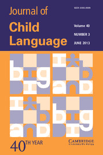
JOURNAL OF CHILD LANGUAGE
Connecting Scholars in the Journey of Child Language ResearchJOURNAL OF CHILD LANGUAGE, published by Cambridge University Press, is a premier scholarly journal dedicated to the exploration and examination of language development in children. Since its inception in 1974, the journal has become an authoritative source in the fields of Developmental and Educational Psychology, Experimental and Cognitive Psychology, and Linguistics, boasting significant impact as evidenced by its ranking in the top quartiles across these domains. With an impressive impact factor and a commitment to advancing research, the journal serves as a vital platform for researchers, educators, and practitioners interested in the intricacies of language acquisition and cognitive development in children. The 2023 Category Quartiles place it in Q1 for Linguistics and Language, further establishing its excellence. Fostering a rich intellectual community, the journal invites contributions that advance our understanding of child language, promising a broad readership in both the social sciences and humanities.
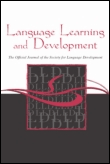
Language Learning and Development
Driving insights in cognitive development and language education.Language Learning and Development, published by Routledge Journals, Taylor & Francis Ltd, is a premier academic journal that stands at the forefront of research in the fields of education and linguistics. With a robust ISSN of 1547-5441 and E-ISSN 1547-3341, this journal not only boasts an impressive Q1 classification in both Education and Linguistics for 2023 but also ranks favorably in Scopus metrics, highlighting its significance in advancing scholarship. Situated in the United Kingdom, it focuses on the intersection of language acquisition, cognitive development, and pedagogical practices, making it an essential resource for researchers, educators, and students alike. Given its commitment to publishing rigorous research articles, Language Learning and Development aims to foster dialogue and explore innovative methodologies in language learning, providing an invaluable platform for contemporary issues and advancements in this dynamic field.

Annual Review of Linguistics
Connecting Scholars Through Comprehensive ReviewsAnnual Review of Linguistics is a premier scholarly journal dedicated to advancing the field of linguistics through comprehensive and insightful reviews of current research and emerging trends. Published by ANNUAL REVIEWS, this journal is recognized for its high impact, evidenced by its Q1 ranking in the Linguistics and Language category and exceptional placements in the Scopus Ranks, positioning it in the top 2% of its field. Since its inception in 2015, the journal has served as a vital resource for researchers, professionals, and students seeking to deepen their understanding of language theories, acquisition, processing, and sociolinguistics. With no Open Access currently available, the Annual Review of Linguistics is esteemed for its rigorous peer-reviewed articles that synthesize a wealth of knowledge, making it an indispensable tool for advancing research and dialogue within the linguistic community.
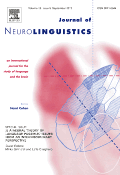
JOURNAL OF NEUROLINGUISTICS
Bridging Language and Cognition for a Deeper UnderstandingJOURNAL OF NEUROLINGUISTICS, published by Pergamon-Elsevier Science Ltd, is a premier academic journal that rigorously explores the intersection of language and the brain, emphasizing the cognitive and neurological underpinnings of linguistic processes. With an ISSN of 0911-6044 and an E-ISSN of 1873-8052, this journal has established itself as a crucial resource for researchers, professionals, and students in the fields of linguistics, cognitive neuroscience, and psychology. Boasting an impressive Q1 classification in Linguistics and Language and Arts and Humanities (miscellaneous) for 2023, the journal demonstrates significant impact, having achieved a ranking within the 91st percentile in Linguistics and Language according to Scopus rankings. The scope of the journal spans comprehensive studies from 1985 to 2025, reflecting a long-standing commitment to advancing the understanding of how language interacts with human cognition. Although it does not currently offer open access, its relevance extends well beyond its articles, contributing to ongoing scholarly dialogues and fostering new insights in the study of neurolinguistics.
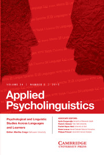
APPLIED PSYCHOLINGUISTICS
Unveiling the Cognitive Mechanisms of CommunicationApplied Psycholinguistics, published by Cambridge University Press, is a premier journal in the fields of linguistics, psychology, and cognitive science, with a focus on the intersection of language and psychological processes. Since its inception in 1980, the journal has consistently provided a platform for high-quality research, achieving impressive rankings in various categories as of 2023, including Q1 status in Linguistics and Language, and Q1 in Psychology (miscellaneous). With a focus on experimental and cognitive psychology, it fosters the exploration of language acquisition, social communication, and cognitive mechanisms underlying language use. Although it is not available as an Open Access journal, its rigorous peer-review process and impactful articles make it a significant resource for researchers, professionals, and students alike. The journal's commitment to advancing knowledge is evident through its contributions to both theoretical and applied psycholinguistic research. Whether you're a seasoned researcher or a student eager to delve into psycholinguistics, this journal serves as an essential resource for keeping abreast of cutting-edge developments in the discipline.

JOURNAL OF MEMORY AND LANGUAGE
Pioneering Research at the Intersection of Memory and LanguageJOURNAL OF MEMORY AND LANGUAGE, published by Academic Press Inc Elsevier Science, is a prestigious journal dedicated to advancing the understanding of cognitive processes related to language and memory. With an impact factor that underscores its authority and relevance, the journal has achieved remarkable recognition, ranking in the Q1 quartile across multiple disciplines such as Artificial Intelligence, Experimental and Cognitive Psychology, Linguistics and Language, and Neuropsychology and Physiological Psychology, as of 2023. With its origins tracing back to 1985, the journal continually provides a platform for high-quality research and innovative studies that intersect diverse fields including cognitive science and linguistics. Although it does not offer open access, the Journal of Memory and Language serves as an essential resource for researchers and professionals seeking to explore the intricate interplay between memory and language. Make sure to access state-of-the-art research that not only informs theoretical frameworks but also has practical implications in real-world situations.
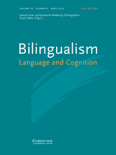
Bilingualism-Language and Cognition
Unlocking the Cognitive Dimensions of BilingualismBilingualism-Language and Cognition, published by Cambridge University Press, is a leading journal in the fields of Education and Linguistics, renowned for its rigorous academic contributions and influential research. With an impressive impact factor placing it in the Q1 quartile of both fields, this journal ranks among the top-tier publications globally, reflecting its commitment to advancing the understanding of bilingualism and its cognitive implications. Since its inception in 2005, Bilingualism-Language and Cognition has garnered significant attention, evidenced by its remarkable Scopus rankings—11th in Language and Linguistics and 12th in Social Sciences. Dedicated to publishing high-quality original research, reviews, and integrative studies, the journal aims to foster interdisciplinary dialogue among researchers, educators, and practitioners. Although not currently an open access journal, it remains a vital resource for those engaged in bilingualism research and its cognitive dimensions, contributing to the academic landscape from its home in Cambridge, United Kingdom.

Languages
Navigating the evolving landscape of language and linguistics.Languages, published by MDPI, is a prestigious open-access journal dedicated to the field of Linguistics and Language studies. Since its inception in 2016, this journal has rapidly established itself as a leading platform for high-quality research, achieving an impressive Q1 ranking in 2023 and standing out in both the Arts and Humanities as well as the Social Sciences categories with significant percentile rankings (76th and 74th respectively). Based in Switzerland, Languages fosters an international community of scholars who are committed to exploring the multifaceted dimensions of language, from theoretical frameworks to practical applications. With a robust e-ISSN of 2226-471X, the journal prioritizes accessibility, allowing researchers, professionals, and students to freely engage with cutting-edge research and insights. By bridging the gap between theory and practice, Languages plays a crucial role in advancing our understanding of linguistic phenomena, making it an invaluable resource for anyone invested in the study of language.
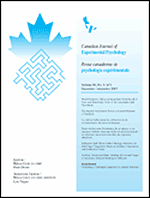
CANADIAN JOURNAL OF EXPERIMENTAL PSYCHOLOGY-REVUE CANADIENNE DE PSYCHOLOGIE EXPERIMENTALE
Unveiling the Science of the Human MindCanadian Journal of Experimental Psychology / Revue canadienne de psychologie expérimentale (ISSN 1196-1961, E-ISSN 1878-7290), published by the Canadian Psychological Association, serves as a vital resource in the fields of Experimental and Cognitive Psychology and general psychological research. With a respectable impact factor that places it in the Q3 category for both Experimental Psychology and miscellaneous Medicine (2023), this journal offers a platform for innovative research that furthers our understanding of psychological processes. Spanning years from 1993 to 2024, it connects researchers, professionals, and students to contemporary findings and methodologies, fostering a collaborative environment for the advancement of psychological science. Though it does not currently offer Open Access, the journal's commitment to quality and relevance in psychological research continues to make it an important part of the academic landscape, supporting the dissemination of knowledge within a global community.

JOURNAL OF PSYCHOLINGUISTIC RESEARCH
Connecting Language and Thought Through Rigorous InquiryJOURNAL OF PSYCHOLINGUISTIC RESEARCH is a premier scholarly publication dedicated to the interdisciplinary exploration of language and cognition. Established in 1971 and published by Springer/Plenum Publishers, this journal serves as a vital platform for researchers in Experimental and Cognitive Psychology, Linguistics, and related fields. With an impressive reputation reflected in its 2023 Category Quartiles—Q3 in Experimental and Cognitive Psychology, Q1 in Linguistics and Language, and Q2 in Psychology (miscellaneous)—the journal ranks prominently within the Scopus database, reaching the 88th percentile in Language and Linguistics. Researchers and professionals have the opportunity to disseminate their findings effectively, enriching contemporary understanding of psycholinguistic phenomena through rigorous peer-reviewed articles. Although currently not an open-access journal, it provides extensive access options that cater to a global audience, ensuring that the latest research is readily available to those dedicated to advancing this dynamic field. We invite scholars, practitioners, and students to engage with this essential resource for fresh insights and innovative research methodologies.